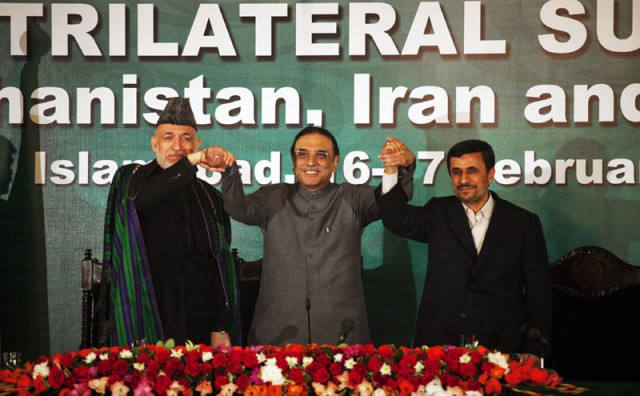Trilateral summit in Islamabad
Had India been there in Islamabad, the 4 could swing regional strategic balance in favour of peace, economic activity.

Trilateral summit in Islamabad
President Hamid Karzai of Afghanistan, ever the pragmatist in discussions, wants Pakistan to make up with America and reopen the Nato supply routes something which he argues will also financially benefit Pakistan. He wants Pakistan to help him tackle the Taliban in a separate dialogue which leaves the US out. President Mahmoud Ahmadinejad wants Iran to break out of its heroic isolation through an economic opening with Pakistan and India. President Asif Ali Zardari wants to avert economic collapse in Pakistan by leaning on Iran’s gas pipeline and electricity supply into Balochistan. Both Iran and Pakistan think their nuclear programmes are under threat.
Counterterrorism may be an easy subject if the three get together strategically. Iran has communicated much better with the Karzai government than with the Taliban. Its connection with the Northern Alliance is firm and if Pakistan wants to be on the same page, it will have to diversify its pro-Pakhtun Afghan policy. The two have behaved civilly over Baloch terrorism into Iran and may agree on the protection of the Hazara community in Quetta which the authorities there have steadily ignored.
Pakistan’s pragmatism will be understood by the world on the subject of the pipeline. It might be inclined even more to reliance on Iran because of the latter’s offer of deferred payment on the gas it will export. After that, Pakistan and Iran will have to plan how they can circumvent the sanctions placed on Iran’s State Bank to enable Pakistan to pay for the gas which is three times more expensive than the domestic gas it currently consumes. President Ahmadinejad is eager to break the isolation he has keenly embraced in the past, if Pakistan and India can help.
This brings us to the fourth party that is not present at the summit: India. New Delhi is a close ally of both Iran and Afghanistan and boasts a growth rate that makes it an important engine for economic revival in the region. India buys Iranian oil together with China and will not listen to the US, despite the pledges made by former president George W Bush to the US Congress under the Hyde Act allowing the India-US nuclear deal. Iran is also the alternative trade route between India and Afghanistan if Pakistan is does not come on board. Pakistan must see the China factor here too and resist the Defence of Pakistan Council with its non-state actors threatening to attack if Pakistan allows free trade with India.
There will be three US allies in this seemingly rebellious quadrilateral arrangement in the region: India, Afghanistan and Pakistan. All three have national interests that don’t gibe with the current US policy of isolating and punishing Iran for its ambition to go nuclear. In the background lurk Russia and China, both economically aligned with Europe and the US, but unwilling to let Iran be attacked. Had India been there in Islamabad, the four could swing the regional strategic balance in favour of peace and increased economic activity. Pakistan is the only state out of the three which is not closely economically aligned with India, but that can change. One hopes that a ‘consensus of four’ in favour of Iran can persuade the latter to adopt a path more in line with its own assertion that Islam forbids the development of a nuclear weapon.
The trilateral summit has two strong pro-India presidents dialoguing with a presumably sympathetic-to-India President Zardari saddled with an Afghan policy that no one in the region agrees with. The summit could have been quadrilateral with a lot of consequent global wallop which it doesn’t have now.
Published in The Express Tribune, February 18th, 2012.















COMMENTS
Comments are moderated and generally will be posted if they are on-topic and not abusive.
For more information, please see our Comments FAQ